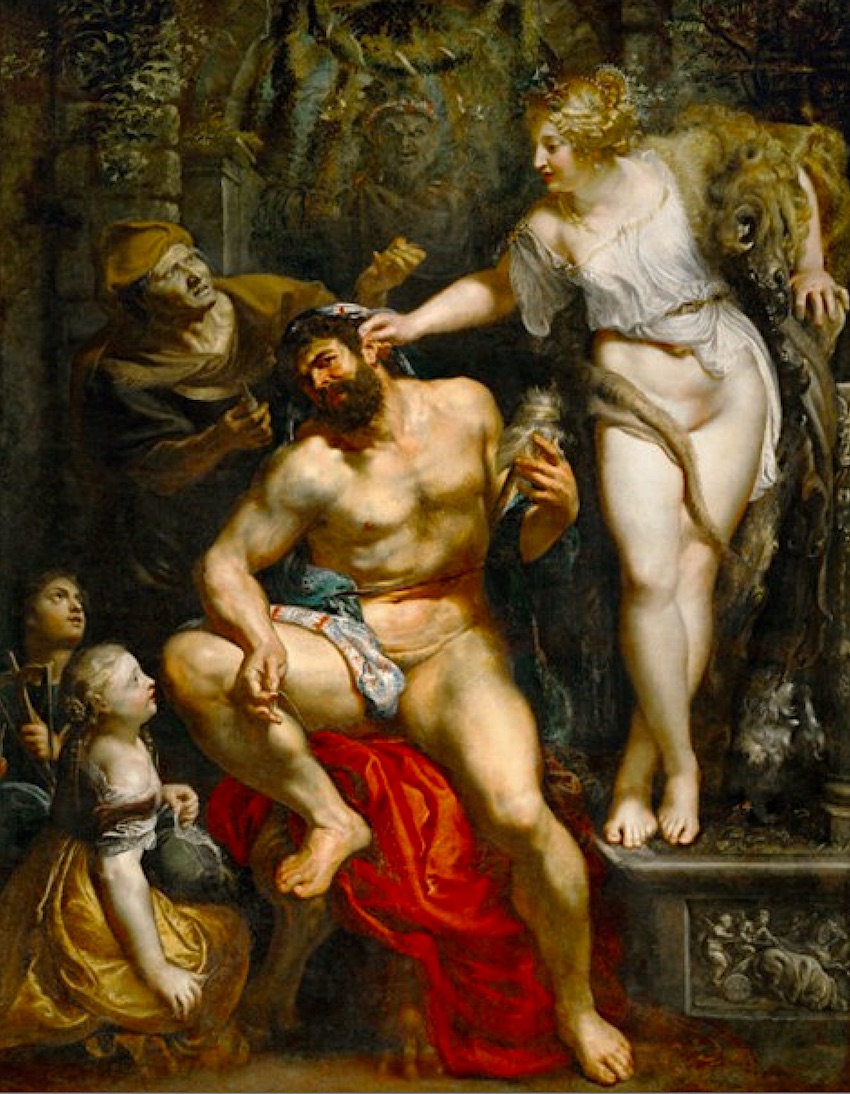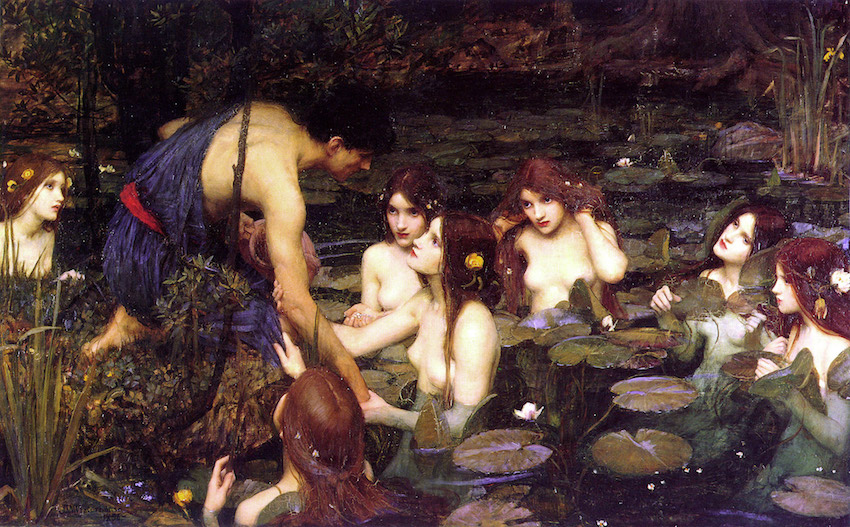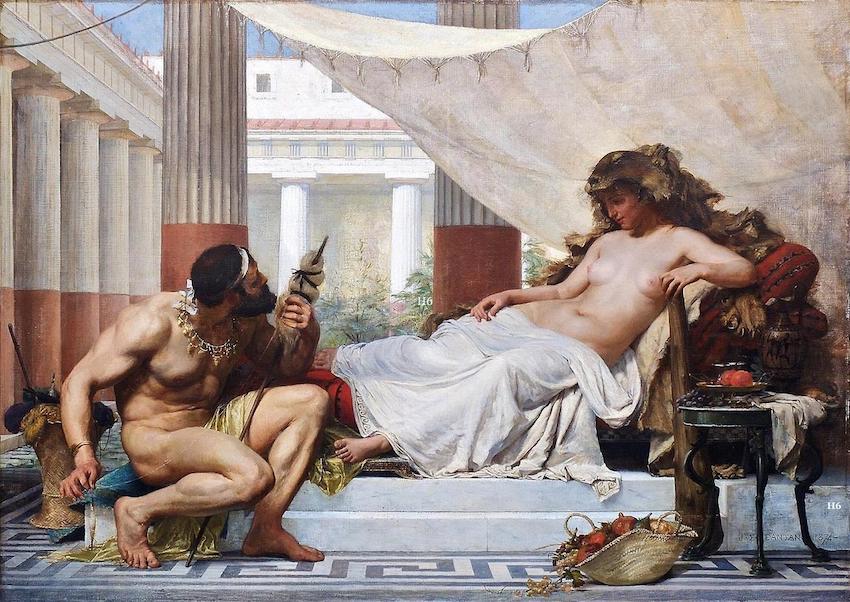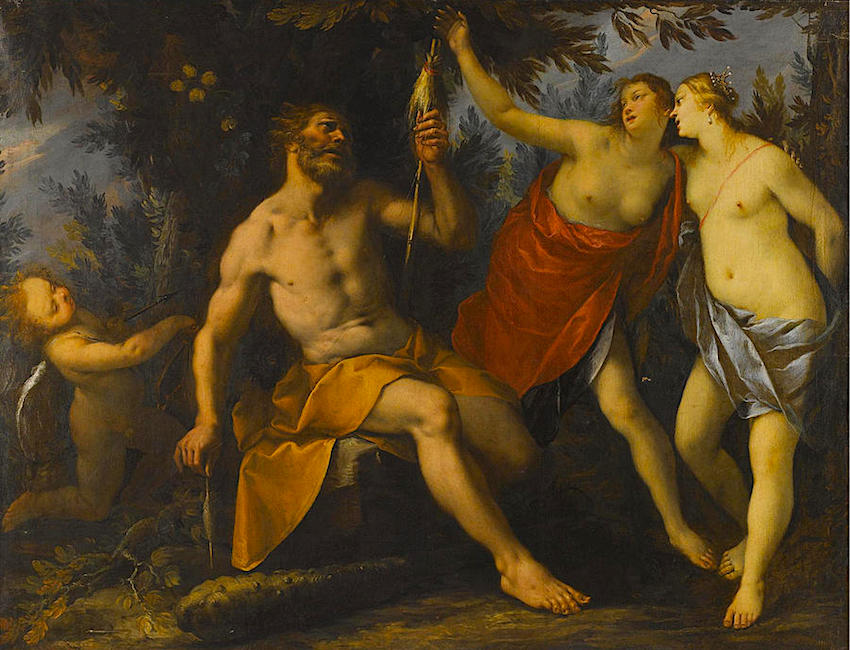Omphale of Lydia

Rubens, Peter Paul - Hercules and Omphale - 1602-1605
Hermes sold Herakles to Omphale, the queen of Lydia, for a price of three silver talents; Eurytos refused to accept this payment, but Herakles became Omphale’s slave anyway. Omphale had inherited the rule of Lydia (in western Asia Minor) from her husband Tmolos, who died when a mad bull sent by Artemis threw him onto sharp stakes. Tmolos had raped Arrhippe, a virgin companion of Artemis, in the goddess’ own temple; when Arrhippe hanged herself in shame, Artemis sent the bull to punish Tmolos.
During the period of servitude to Omphale, Herakles performed several
tasks similar to the labors demanded by Eurystheus:
a. At Ephesos,
southwest of Lydia, he captured and bound the Kerkopes. These were dwarfish
pranksters who played tricks on passers-by near Ephesos or at the narrow pass of
Thermopylai in Thessaly. According to Tzetzes they were two brothers who had
laughed at their mother, the Okeanid Theia, when she warned them that “they had
not yet met the man with a black bottom.” While Herakles was sleeping they
stole his wallet, but he awoke, caught them, and hung them head downwards from
his shoulders (or from a pole, as artistic versions usually portray this
incident); since it was warm Herakles was wearing no trousers and from their
vantage point the Kerkopes could see his buttocks and genitals, “bushy and
black-haired;” remembering what their mother had told them they broke into
laughter and Herakles, equally amused, set them free.
b. At Aulis, on the
Greek mainland opposite Euboia, or in Lydia he killed the arrogant vine-grower
Syleus, who forced strangers to work in his vineyards and then put them to
death. After tearing up and burning Syleus’ vines, Herakles killed him and his
daughter Xenodoke with his own hoe. The name Xenodoke means “She who receives
strangers,” and in another version Syleus’ daughter was raised by her uncle
Dikaios on Mount Pelion; Herakles fell in love with her and married her, but
when Herakles had to leave for some reason she died of loneliness before his
return.
c. Another criminal farmer, Lityerses, was the brother or son of
Midas, king of Phrygia. He would force strangers to work for him or to compete
with him in reaping, then cut off their heads. Herakles defeated Lityerses in
the reaping contest and cut off his head.
d. He defeated the Itoni, who
had been raiding the land of Omphale, destroyed their city, and enslaved its
inhabitants.
e. He killed a monstrous snake which was destroying men and
crops in Lydia.
Sometimes the Kerkopes are more numerous, larger in size, and more seriously
malevolent; Diodoros says that Herakles killed some of them and brought the rest
in chains to Omphale, and Ovid says their crimes and lies so irritated Zeus that
he changed them into apes who lived on two islands near the Bay of Naples.
While in the service of Omphale, Herakles found the corpse of Ikaros washed ashore on the island Doliche. He buried the body and renamed the island Ikaria. Ikaros’ grateful father Daidalos made a statue of Herakles at Pisa (near Olympia) or at Corinth, but when Herakles came upon the statue at night he thought it was alive and threw a stone at it.

Hylas and the Nymphs by John William Waterhouse 1896 Manchester Art Gallery
It was also while Herakles was with Omphale, according to Apollodoros, that the Kalydonian boar hunt and the voyage of the Argonauts took place, and Theseus made his Herakles-like journey from Troizen to Athens, killing criminals and monsters along the way. Sometimes Herakles is included among the Argonauts, but he is clearly a mythic afterthought and usually abandons the expedition before it ever reaches Colchis. In the most interesting version the Argonauts' first stop after their departure from Iolkos (modern Volos) was the island of Lemnos, whose inhabitants were all women. Some years before Aphrodite had afflicted the women of Lemnos with a terrible odor. Repelled by this, their husbands left their wives and took concubines from the Thracian mainland. The women then killed all the men on the island (except Hypsipyle, who saved king Thoas, her father, by putting him in a box and throwing it into the sea). When the Argonauts arrived, the love-starved Lemnian women invited the Argonauts to spend time with them, one man with each woman. Every day Herakles, who stayed on the ship, sent a message to his fellow sailors, "Have you forgotten you are heroes on an heroic mission? Get back to the ship." Finally the Argonauts resumed their voyage and found that Herakles had not been alone on the Argo but had with him his young lover Hylas. At the next stop Mysia (south of Troy on the west coast of Turkey), Hylas was sent to fetch water but was kidnapped by pond nymphs who pulled him into the water and made him stay with them. When Hylas did not return, Herakles went looking for him, and now it was the Argonauts' turn to send messages telling him to return. Herakles said. "Go on without me. I'll walk back to Greece," and so he did.
In the late epic Argonautika Herakles is one of the crew until Mysia,
where he stays behind to search for his lost lover Hylas; Herodotos places a
similar story (but without Hylas) in Thessaly at Aphetai, and Pherekydes says
that Herakles was left behind at Aphetai because the ship Argo, which could
speak, complained about the heaviness of Herakles. Theokritos, on the other
hand, says that Herakles was no deserter but finished the journey to Colchis on
foot, and Diodoros says that he was elected to be general of the Argonauts,
accompanied the voyage throughout, and instituted the Olympic games at the end
of the expedition.

Heracles at the Feet of Omphale. 1874 Edouard Joseph Dantan
Herakles’ enslavement to Omphale is qualitatively different from his performance of the labors for Eurystheus, his rival and hated master. Omphale and Herakles became lovers (husband and wife, in one version) and had a son named Lamos or Agelaos, ancestor of the famous Lydian king Kroisos. By a slave-girl of Omphale Herakles had another son, Kleodaios or Alkaios, and his descendants ruled Lydia for twenty-two generations.
A peculiar aspect of Herakles’ stay with Omphale is the custom they adopted of wearing one another’s clothing. Painters portrayed Herakles wearing a yellow petticoat and having his hair combed by Lydian girls. Ovid says that Herakles wore a diaphanous purple negligee and a girdle which could not fit around his waist, while Omphale wore his lion-skin and carried his club. While the two lovers were asleep, wearing each other’s clothes, in a Lydian cave, the god Pan crept in and began to feel his way through the darkness. When he reached the beds, he first touched the lion-skin; thinking this was Herakles he lay down next to the other sleeping figure and pulled up its dress. Discovering a pair of hairy thighs, he nevertheless was about to proceed further when Herakles awoke and pushed him away. For this reason, says Ovid, Pan hates deceptive clothing and those who participate in his rites must worship naked.
The story of Pan's unfortunate foray is found in Ovid's Fasti.

Hercules and Omphale by Giovanni Stefano Danedi (Italian, 1608–1689)
Herakles’ subjection to Omphale is a concrete manifestation of the enslavement by women which characterizes his entire life. Hera is the principal agent of Herakles’ servitude, but he is equally the slave of his unquenchable desire for the innumerable women he seeks and for whom, like a perpetual suitor, he performs one impossible task after another. Underlying this unending search is Herakles’ rejection from Hera’s breast when he was an infant; the enormous and insatiable desire which began at this point will be finally satisfied only when he becomes a god and is reborn as Hera’s child. The relationship between Herakles and Omphale, however, seems to be a particularly positive one, and the reason for this may be implied in the meaning of Omphale’s name, the feminine form of the Greek word for “umbilicus.” Herakles’ situation with Omphale is like that of the newborn infant with its mother, prior even to physical separation; it is a relationship of absolute dependence and at the same time a totally fulfilling relationship, in which the mother is never absent and herself satisfies all needs. Herakles’ wearing of women’s clothing is also significant; an aspect of his enslavement to desire is the need to be a conquering and virile hero par excellence, and this need becomes a compulsion which defines Herakles’ identity. With Omphale, however, Herakles can temporarily be free of his identity as the greatest of all heroes and of the necessity to prove himself on every occasion. In other words, Herakles is like the aging gunman in western movies, who must live up to his reputation in every town and against every opponent; what both Herakles and the gunman really want, at least for a time, is freedom from the identity their inner needs have forced them to assume.
